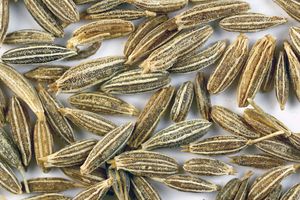Note: This is a project under development. The articles on this wiki are just being initiated and broadly incomplete. You can Help creating new pages.
Cuminum cyminum - Ajaji, Cumin seed
Cuminum cyminum is a flowering plant in the family Apiaceae, native from the east Mediterranean to South Asia.Its seeds (each one contained within a fruit, which is dried) are used in the cuisines of many different cultures, in both whole and ground form. It also has many uses as a Traditional medicine plan.
Contents
Uses
Pimples, Cracks in Skin, Sores, Diarrhoea, Skin diseases, Intrinsic haemorrhage, Poisons.
Parts Used
Bark, Dried Leaves, Leaves, Fruits.
Chemical Composition
Cumin seeds are antimicrobial, anti-diabetic, antiepileptic, antifertility, anticancer, antioxidant and immunomodulatory.[1]
Common names
| Language | Common name |
|---|---|
| Kannada | Jirage, Bilejiregeu |
| Hindi | Jira, Safed jira |
| Malayalam | Jeerakam |
| Tamil | Sheeragam, Chirakam, Jeerakam |
| Telugu | Jilakarra, Tella Jilakarra |
| Marathi | NA |
| Gujarathi | NA |
| Punjabi | NA |
| Kashmiri | NA |
| Sanskrit | Ajaji |
| English | Cumin seed, Cumin |
Habit
Identification
Leaf
| Kind | Shape | Feature |
|---|---|---|
| Simple | lanceolate | alternate, spiral, clustered at twigs end, tawny hirsute, caducous, leaving annular scar |
.[2]
Flower
| Type | Size | Color and composition | Stamen | More information |
|---|---|---|---|---|
| Unisexual | 14cm long | Pendulous, Ovoid | male flowers in axillary spikes, pendulous; female flowers in axillary spikes, ovoid |
Fruit
| Type | Size | Mass | Appearance | Seeds | More information |
|---|---|---|---|---|---|
| Syncarp (sorosis), subglobose or ellipsoid with long echinate processes, orange when ripe | seeds many, ovoid. | {{{6}}} |
Other features
List of Ayurvedic medicine in which the herb is used
- Vishatinduka Taila as root juice extract
Where to get the saplings
Mode of Propagation
How to plant/cultivate
In terms of taking care of the plant, minimal pruning is required Cutting off dead branches from the interior of the tree is only sometimes needed. In addition, twigs bearing fruit must be twisted or cut down to the trunk to induce growth for the next season. Branches should be pruned every three to four years to maintain its productivity. Stingless bees such as Tetragonula iridipennis are jackfruit pollinators, and as such, play an important role in jackfruit cultivation.
Commonly seen growing in areas
Photo Gallery
References
- ↑ "bimbima ayurvedic medicine"
- ↑ Cite error: Invalid
<ref>tag; no text was provided for refs namedLeaf
External Links
- Artocarpus hirsutus on ENVIS Centre on Conservation of Medicinal Plants
- Artocarpus hirsutus on India Biodiversity Portal
- Artocarpus: A review of its traditional uses, phytochemistry and pharmacology
- Artocarpus: A review of its phytochemistry and pharmacology
- Pharmacognostical studies on the bark of Artocarpus hirsutus Lam
- Pages with reference errors
- Ayurvedic Herbs known to be helpful to treat Pimples
- Ayurvedic Herbs known to be helpful to treat Cracks in Skin
- Ayurvedic Herbs known to be helpful to treat Sores
- Ayurvedic Herbs known to be helpful to treat Diarrhoea
- Ayurvedic Herbs known to be helpful to treat Skin diseases
- Ayurvedic Herbs known to be helpful to treat Intrinsic haemorrhage
- Ayurvedic Herbs known to be helpful to treat Poisons
- Herbs with Bark used in medicine
- Herbs with Dried Leaves used in medicine
- Herbs with Leaves used in medicine
- Herbs with Fruits used in medicine
- Herbs with common name in Kannada
- Herbs with common name in Hindi
- Herbs with common name in Malayalam
- Herbs with common name in Tamil
- Herbs with common name in Telugu
- Herbs with common name in Sanskrit
- Herbs with common name in English
- Habit - Tree
- Index of Plants which can be propagated by Seeds
- Index of Plants which can be propagated by Cuttings
- Index of Plants which can be propagated by Airlayers
- Herbs that are commonly seen in the region of Western Ghats
- Herbs that are commonly seen in the region of Malabar Coast
- Herbs


